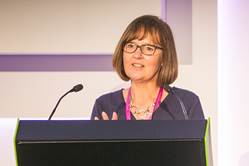
Making History: health visiting during COVID-19 provides an insight into the pace and scale of change as health visiting services adapted to working during the pandemic. It shines a spotlight on the vital ‘safety net’ that health visitors provided for babies and young children through a series of case studies.
While some families enjoyed the relative peace of an enforced slower pace of life, others were negatively impacted by lockdown and home was not a safe place, with rates of domestic violence and abuse, mental health problems and safeguarding concerns quickly becoming a source of concern.
 Alison Morton, director of policy at the Institute of Health Visiting, said, ‘It has taken a global public health pandemic to shine a spotlight on the importance of the health visiting service.
Alison Morton, director of policy at the Institute of Health Visiting, said, ‘It has taken a global public health pandemic to shine a spotlight on the importance of the health visiting service.
‘Parents reached out to health visitors for support as many other sources of support were no longer available. Health visitors are Specialist Community Public Health Nurses providing a vital “safety net” for babies, young children and their families whose needs can easily be hidden from sight. Their specialist public health skills, supporting babies, young children and their families during the biggest public health emergency in living memory, have been needed more than ever.’
The report commends health visitors for rising to the challenge with professionalism and autonomy, flexing and developing innovative service ‘workarounds’ to ensure that families receive the best possible support.
It highlights the different ways that they have responded, with many introducing virtual contacts instead of face-to-face, as well as rapidly responding to urgent needs to support families using Personal Protective Equipment (PPE).
Councillor Ian Hudspeth, chair of the Local Government Association Community Wellbeing Board, described the report as ‘testimony’ to the commitment and resilience of health visitors and said it illustrates the pivotal role they play in ensuring children and families get the support they need in challenging times.
He added, ‘In the upcoming spending review, we are asking the Government to reverse the £700 million of public health reductions, to enable councils to strengthen this workforce and ensure we can continue to support families when they need us most.’
Commenting on the report, Andrew Fellowes, public affairs manager at the NSPCC, said, ‘The pandemic has had an unprecedented impact on new parents and their ability to cope with what is already one of life’s biggest challenges. We’ve seen increased calls to our helpline about issues like domestic abuse and mental health problems that can make it more difficult for families to give their babies the best start in life.
‘Despite the extraordinary challenges, health visitors have rapidly adapted to support new parents as best they can. Sadly however, a history of cuts to public health funding and a significant decline in NHS health visitors means that for too long not all families have received the support they need, and this has been compounded by the pandemic.
‘The Government must prioritise rebuilding the workforce, backing this up with adequate funding to ensure all families receive consistent care through the Healthy Child Programme. This needs to be reflected in the upcoming Spending Review to avoid failing a generation of children before they are born.’
Alison Morton concluded, ‘We need to learn from Covid-19 and the experiences of families and health visitors to ensure that the health visiting service is strengthened and fit to face the challenges that lie ahead as we adapt to living with the virus for the foreseeable future. The challenges that we face are not insurmountable - individually and collectively we have the ability to put things right. But this requires bold action to make the difference – there is no time to waste, the time to act is now.’
In July, at a Local Government Association webinar, Supporting the development of babies and young children during the COVID-19 outbreak, Alison Morton put forward the following recommendations for restoration of the health visiting service:
Register now to continue reading
Thank you for visiting Nursery World and making use of our archive of more than 35,000 expert features, subject guides, case studies and policy updates. Why not register today and enjoy the following great benefits:
What's included
-
Free access to 4 subscriber-only articles per month
-
Unlimited access to news and opinion
-
Email newsletter providing activity ideas, best practice and breaking news
Already have an account? Sign in here









